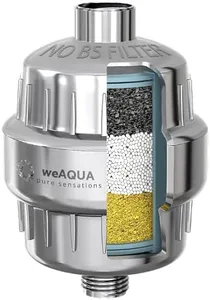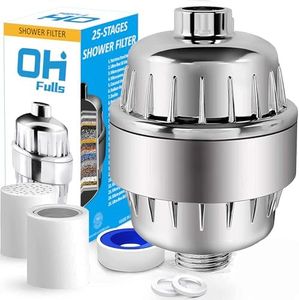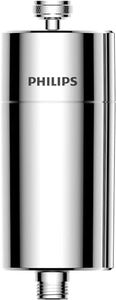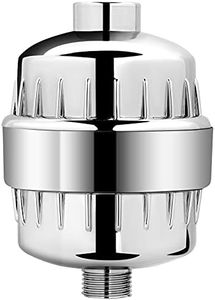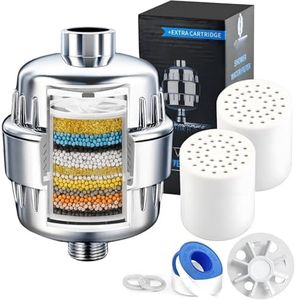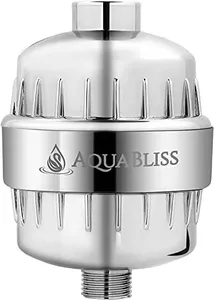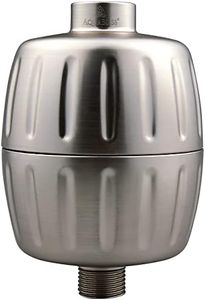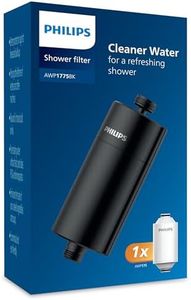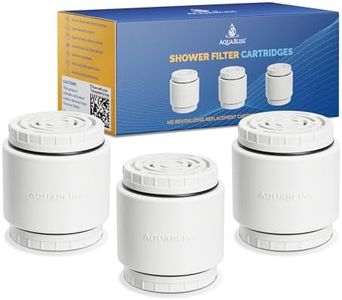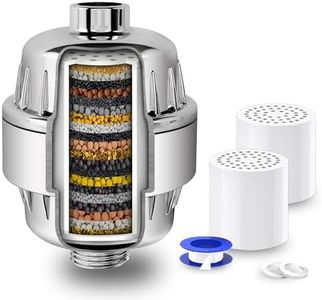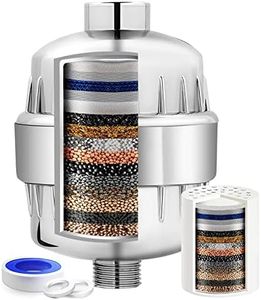We Use CookiesWe use cookies to enhance the security, performance,
functionality and for analytical and promotional activities. By continuing to browse this site you
are agreeing to our privacy policy
10 Best Shower Filters
From leading brands and best sellers available on the web.By clicking on a link to a third party's website, log data is shared with that third party.
Buying Guide for the Best Shower Filters
Choosing the right shower filter can make a big difference in your daily routine, especially if you’re concerned about water quality, skin and hair health, or general well-being. Shower filters are designed to reduce or remove unwanted substances from your water, like chlorine, heavy metals, or sediment. Before picking one, consider what you want the filter to accomplish—whether it’s for skin sensitivity, hair care, or simply for peace of mind. Think about your water source (is it hard water, has a strong chlorine smell, etc.), how easy it is to install or maintain the filter, and how often you’re willing to replace filter cartridges.Filtration TypeFiltration type refers to the technology or materials used inside the shower filter to clean the water. Common types include activated carbon, KDF (Kinetic Degradation Fluxion), and vitamin C filters. This spec is crucial because different types target different contaminants: carbon is great for chlorine and odors; KDF tackles heavy metals and some bacteria; vitamin C specifically neutralizes chlorine and chloramines. If your main concern is chlorine, a vitamin C or carbon-filtered unit is a good pick. Those with skin sensitivities or allergies might benefit from a KDF filter that goes after a broader range of irritants. Consider what’s most likely in your local water when choosing the filtration type that’s right for you.
Contaminant Removal CapacityThis spec tells you what substances the filter is effective against and how much it can actually remove. Some filters claim to remove only chlorine, while others list sediments, heavy metals, sulfur, and even bacteria. It's important because a filter that doesn’t target your primary concerns won’t give you the results you want. If your skin feels itchy after showers or your hair is frizzy, you might be dealing with high chlorine or hard water minerals, so pick a filter that mentions those specifically. Always check what contaminants are covered and match them to what you hope to reduce or eliminate.
Flow RateFlow rate describes how much water passes through the filter per minute, usually measured in gallons per minute (GPM). A higher flow rate means more water comes out quickly, but if the rate is too high, the filter may not effectively remove contaminants. Standard ranges are between 1.5 and 2.5 GPM. If you like powerful showers, lean toward the higher end, but be aware some filtering efficiency might be reduced. For maximum purification, or if you’re not bothered by a gentler flow, a lower flow rate is better. Think about your preference for water pressure and balance it with your need for thorough filtration.
Filter LifespanFilter lifespan is how long the internal cartridge lasts before needing replacement, typically measured in months or total gallons filtered. This matters because replacing cartridges too often can become inconvenient. Lifespans commonly range from 3 to 6 months, but can be longer. If you have a large family or take frequent showers, consider filters with longer longevity or those that are easy to replace. If you want minimal upkeep, a longer lifespan will save you time and hassle.
Installation MethodThis tells you how the filter attaches—either directly to your existing shower arm, as part of the showerhead, or as an in-line unit between the pipe and head. Installation method is important for ease of setup and compatibility with your existing shower fixtures. Most filters are designed for DIY installation with basic tools and fit standard shower arms, but some require more effort or may not fit certain setups. If you’re not keen on home projects, look for filters labeled as ‘tool-free’ or ‘quick install.’ For old or custom showers, double-check compatibility.
